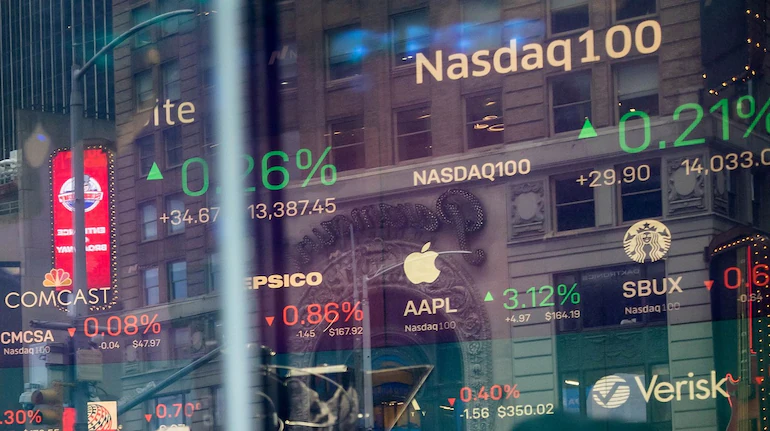Stock markets tumble globally as Trump defends tariff strategy

Posting on social media, he called the tariffs “a chance to do something that should have been done decades ago,” and added, “Don’t be Weak! Don’t be Stupid! Be Strong, Courageous, and Patient, and GREATNESS will be the result!”
Global financial markets reeled on Monday as US President Donald Trump urged Americans to remain calm and avoid what he called “stupid” panic, despite a deepening market crash following China’s move to hit back at US tariffs.
New York’s major indices opened with sharp losses, each falling more than three percent. European stocks also tumbled, while Asian markets suffered their worst declines in years.
Hong Kong's Hang Seng Index fell by 13.2 %, marking its biggest drop since the 1997 Asian financial crisis. Japan’s Nikkei 225 was also heavily affected, plunging by 7.8%.
As reported by AFP, the panic was triggered by the start of a new 10 percent baseline tariff on global imports that took effect Saturday.
Beginning Wednesday, several countries are expected to be hit harder, with 34% tariffs targeting Chinese goods and 20% levied on European Union products.
Trump defended his administration’s tough trade stance just minutes before markets opened in the US.
Posting on social media, he called the tariffs “a chance to do something that should have been done decades ago,” and added, “Don’t be Weak! Don’t be Stupid! Be Strong, Courageous, and Patient, and GREATNESS will be the result!”
Beijing, which had announced a 34 percent tariff on American goods last week, said its countermeasures were meant to correct US deviations from international trade norms.
"The root cause of the tariff issue lies in the United States," Chinese Vice Commerce Minister, Ling Ji, said during a meeting with US company representatives on Sunday.
He added that the Chinese move aimed to steer Washington “back onto the right track of the multilateral trade system.”
According to AFP, Trump, however, rebuked Beijing’s decision to strike back.
“I warned them,” he said, accusing China of being “the biggest abuser of them all” when it comes to tariffs.
Meanwhile, European Union trade ministers met in Luxembourg to chart a possible response.
French Trade Minister Laurent Saint-Martin said the bloc must consider all measures.
“We must not exclude any option on goods, on services,” he said, calling for a strong stance.
“Open the European toolbox, which is very comprehensive and can also be extremely aggressive,” he added.
Germany’s Economy Minister Robert Habeck echoed this sentiment, saying Europe must be prepared to use its full trade “bazooka,” including a new mechanism meant to counter economic threats.
Ireland, however, struck a more cautious tone. Its Trade Minister Simon Harris warned against targeting services, saying it “would be an extraordinary escalation.”
Trump maintained his position during a conversation with reporters aboard Air Force One on Sunday.
“Sometimes you have to take medicine to fix something,” he said.
He also claimed that world leaders were eager to reach an agreement, saying they were “dying to make a deal.”
Markets have taken a hit since the announcement of the tariffs, with Monday’s losses wiping out trillions of dollars globally.
JPMorgan Chase CEO Jamie Dimon, in a letter to shareholders, raised concerns about the economic impact.
“Whether or not the menu of tariffs causes a recession remains in question, but it will slow down growth,” he warned. He also said the move “will likely increase inflation.”
Taipei recorded its largest-ever single-day loss, tumbling by 9.7%.
In Europe, the Stoxx 600 index dropped 5% by early afternoon, leading to a wipeout of more than 1.5 trillion euros in market capitalization within days.
The US oil market also reacted strongly. The main benchmark contract fell below $60 a barrel, the lowest price since April 2021, amid mounting fears of a looming global recession.
Stephen Innes from SPI Asset Management said the market had delivered a clear signal.
“The market’s telling you in plain language: global demand is vanishing, and a global recession is on the cards and coming on fast,” he stated.
In the midst of the turmoil, more than 50 countries have reportedly contacted Washington to begin talks.
Among them is Japan, whose Prime Minister Shigeru Ishiba confirmed a phone conversation with Trump, during which they agreed to further discussions on the tariffs.
Israel, facing 17 percent tariffs despite close ties with the US, was expected to send Prime Minister Benjamin Netanyahu to Washington on Monday—the first foreign leader to meet Trump since the tariff announcement.
Vietnam, a major exporter with a sizable trade surplus with the US, has also stepped in, requesting a delay of 45 days before the 46 percent tariffs take effect on its goods.
Despite the turmoil, Trump continued to push his case.
“This is the only way to stop the abuse,” he insisted, holding firm even as the economic aftershocks continued to ripple through global markets.
